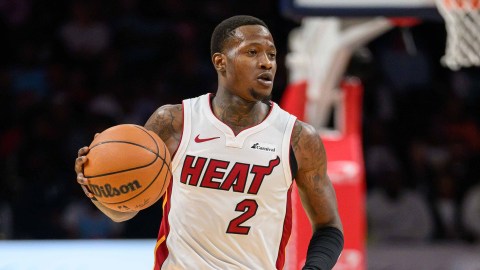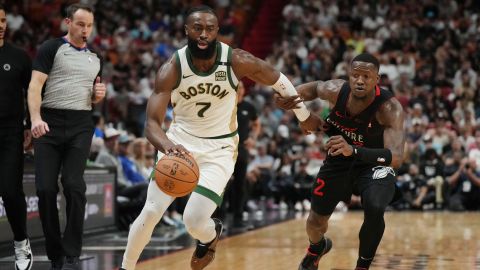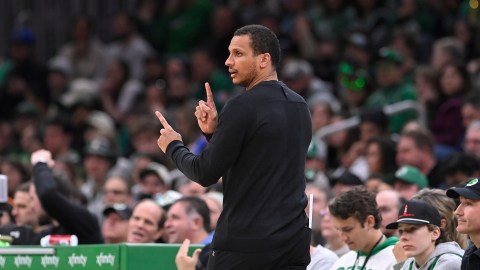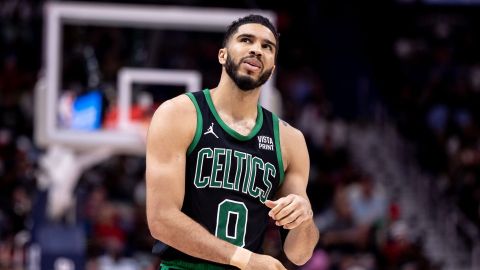 BOSTON — Kevin Garnett was trying to offer consolation. He wanted to calm everyone in the wake of the devastating news that Rajon Rondo would miss the rest of the season with a torn ACL in his right knee, and reassure anyone who would listen that the Celtics are not about to panic.
BOSTON — Kevin Garnett was trying to offer consolation. He wanted to calm everyone in the wake of the devastating news that Rajon Rondo would miss the rest of the season with a torn ACL in his right knee, and reassure anyone who would listen that the Celtics are not about to panic.
In doing so, however, he offered up imagery from one of the darkest eras of Celtics basketball. The irony caused a few of the media members surrounding Garnett in the locker room to squirm uncomfortably, because the phrasing was all too familiar.
“No one’s going to walk through these doors and save us,” Garnett said. “We have to save ourselves.”
The parallels to Rick Pitino‘s infamous “Larry Bird is not walking through that door” news conference in March 2000 would have been terrifying for Celtics fans, who recall that disastrous 35-win season as one of the lowest points in Celtics history. The team was headed for the NBA draft lottery for the fifth consecutive year, and by the end of next season Pitino, mercifully, would be gone.
As the Celtics ponder their next move this season without their All-Star point guard, there is a lesson in the memory — though not the sentiment — of Pitino’s rant. It should be a word of caution to anybody calling upon team president of basketball operations Danny Ainge to “blow up” this roster with a series of drastic in-season moves. The lesson is not simply that “blowing it up” is a bet with unfavorable odds, but that the Celtics once managed a relatively swift turnaround by doing pretty much the opposite.
Thanks to the lottery, the salary cap and the maze-like rules of the collective bargaining agreement, selling off assets in exchange for valuable young players and useful draft picks is nearly impossible. And when such a plan can be pulled off, it usually fails. Losing games on purpose — better known as “tanking” — is a fool’s bet, since it merely gives a team slightly better odds of getting a higher pick in the crapshoot that is the draft. The cap makes it virtually impossible to build a star-studded team purely through free agency, and even old loopholes like sign-and-trades are less workable with the luxury tax due to become more prohibitive next season. This is why the most valuable asset in the NBA, aside from a top-five player, is an expendable player with a large, expiring contract.
Thus, any calls for the Celtics to sell off Garnett, Paul Pierce or anyone else for a rebuild is not just unrealistic, but ill-advised. Kevin Durant and Chris Paul are not walking through that door. Jeff Green and Jason Terry, underachieving players on multiyear deals, are not going to garner surefire future All-Stars, should the Celtics get any team to take them at all. The most likely result of a Celtics fire sale would be three to five years of mediocrity that could make 2000 seem like Nirvana.
As many times as the Celtics have supposedly hit rock-bottom — some might say intentionally — in the last two decades, then-general manager Chris Wallace did not “blow up” the team at the end of Pitino’s tenure. Antoine Walker, Kenny Anderson, Tony Battie and Pierce were all key players two years later, when they reached the Eastern Conference Finals under coach Jim O’Brien. That team was younger than this year’s edition, obviously, so the championship window was not as small. But it was a minor triumph that that squad even had a championship window given the debacle just a couple years earlier. “Blowing it up” is not always the answer.
Blockbuster midseason trades, save for a few isolated examples, are almost always preposterous transactions in retrospect. Front offices spend two solid months every summer formulating and executing a plan for their player personnel, then in roughly half a season they decide to start all over again. With his actions in the offseason, Ainge clearly sent the message that he was building a team that could win now while staying competitive for the next two to three years as Garnett and Pierce transition out. Rondo’s injury should not have altered that general approach.
Rondo was vital to the way the Celtics did things. Was. Did. Past tense. Reactionary observers are still yelling about the Lakers’ need to “play differently,” yet by insisting the Celtics need to throw in the towel on this season, they forget that there is more than one way to play the game of basketball. The probing style and free-wheeling offensive sets run so successfully with Rondo at the helm cannot work with Avery Bradley or Terry running the point. Leandro Barbosa is far from trustworthy running the system over long periods. Courtney Lee is an ideal mid-cost, role-playing wing, but he is not a lead guard.
If the Celtics need a model for how to survive the loss of a superstar, they can look to a team led by one of their own former coaches. The Bulls have fared well enough with Derrick Rose missing large chunks of the last two seasons. Former Celtics assistant coach Tom Thibodeau has managed to replace Rose, a better player than Rondo, with a collection of guards — C.J. Watson, Kirk Hinrich, Nate Robinson — that is inferior to what the Celtics have their stable. Thibodeau was smart enough to recognize that doing the things that made Rose the league’s MVP had to be changed in his absence, so the Bulls learned to rely more on Joakim Noah‘s passing from the high post, the mismatches created by Luol Deng on the wing or Carlos Boozer‘s newfound assertiveness on offense.
It is unfair to expect anything less of the Celtics. Thibodeau worked under Rivers, after all. Garnett, Pierce and Lee noted that Rondo’s responsibilities would have to be consolidated. Rivers invited reporters to write the Celtics’ obituary — “but I’m not,” he added.
Garnett essentially echoed his coach.
“We have a bunch of fighters in here, a bunch of guys who are willing to work and get down the business to put the work in,” Garnett said. “That’s what we’ve always been since I’ve been here under the Doc regime. [Sunday] was hard. I’m not even going to front. [Sunday] was hard.”
Even before Rondo’s injury, the Celtics did not look like a team that could strike fear into the Heat in the playoffs. In that regard, little has changed. In the same vein, the Celtics are just as unlikely to contend for a title now or in the near future if they “blow it up” as if they stand pat. So, all relevant things being equal, the Celtics might be best off seeing what this group can do.
Have a question for Ben Watanabe? Send it to him via Twitter at @BenjeeBallgame or send it here.



